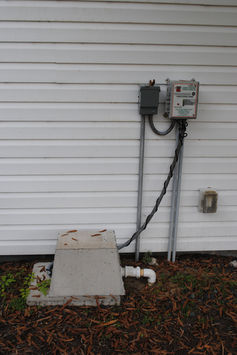
What to Expect During Service Calls
All Homeowners with BAT units must maintain a service contract with a certified service provider (effective 2013). For your general information, our technicians do the following during a service visit:
-
Run Diagnostics on the panel to determine if there were any undetected malfunctions
-
Clean or replace the filter on the blower and level the pad if needed
-
Inspect risers and replace any missing or damaged screws for security
-
Test and record air pressure in unit and backwash if needed
-
Take sludge judge reading in 2 places to determine if the tank needs to be pumped (You do not need to have the tank pumped unless we tell you; these tanks are very efficient)
-
OSIS, LLC doesn't offer pump-outs of your septic system. We can give recommendations on certified pumpers in your county.
-
Inspect hose connections and repair if needed
-
Clean off probe connections
-
Discuss findings with you or leave a door hanger,
-
File report as required with MDE
-
If you have a drip system, change filters and flush lines (additional charge)
-
Secure all riser lids, adding screws if needed
-
If your email is on file, a report will be sent to you electronically
Please note we do not include service on the distribution part of your septic system, unless contracted separately with us, ie; Mounds, LPD systems (secondary pumps) and non Hoot drip sytems.
We are required to report any expired service contracts to MDE. An excerpt from COMAR 26.04.01.07 is below:
(3) The property owner maintains a service contract with a certified service provider.
D. A BAT system shall be operated by and maintained by a certified service provider.
(1) The owner shall ensure that each BAT system is inspected and has necessary operation and maintenance performed by a certified service provider at a minimum of once per year.
Do Not Flush
It's easier to tell you what you should flush than what you shouldn't flush, because really the only things you should ever flush down the toilet are:
-
Urine
-
Fecal matter
-
Toilet paper
Unfortunately, people often think it's okay to flush the following items, all of which belong on the
"Do Not Flush list".
-
Kleenex and other facial tissues
-
Baby wipes (or other personal hygiene wipes)
-
Facial cleansing wipes or make up removers
-
Paper towels or napkins
-
Feminine products (sanitary napkins, pads of all sorts, and tampons)
-
Q-tips and other make up applicators
-
Condoms
-
Latex Gloves
-
Kitty litter
-
Cigarette butts
-
Oil, grease, or food scraps
-
Prescription drugs
-
Using Washing Machine or Dishwasher Pods
Why Are These Items On the Do Not Flush List?
The items listed above are commonly flushed down toilets everywhere, but they are the prime causes of clogged toilets and Septic Systems. People think facial tissues, feminine products and other disposable wipes can go down the toilet, but they are made with fibrous material that does not break down quickly or completely enough to make it through your pipes and out into the sewer system without causing clogs. Small items like Q-tips and mascara applicators do not break down at all and are likely to get wedged in the pipes, and material that normally would pass through the pipes gets caught up in them.
More recently, washing machine/dishwasher pods have gained popularity due to their convenience. Even though they might seem convenient, the outside shell of the pods don't completely dissolve. Parts of the shell will travel through your system and are a big culprit of getting adhered to the septic pump preventing it from operating properly.
Kitty litter is known to get stuck in the bellies of pipes, and food scraps are also likely to settle or get caught on any stray items that may have been accidentally flushed over the years. Oil and grease will coat your pipes like plaque, and other items that are flushed may stick to and add layers to the gunk coating the inside of your pipes. Over time, clogs form.
Systems with pumps…..
Anything that does not break down completely will clog a pump. Manufacturers will not warranty a pump if it burns up due to user neglect. It is not uncommon to find tampons, condoms and various wipes clogging and burning up a pump. The clay and absorbent material in kitty litter and disposable diapers is another culprit. DON’T FLUSH IT.
But Why Can't I Flush Prescription Drugs?
It may seem like a safe and easy way to dispose of expired prescriptions, but prescription drugs should not be flushed for a completely different reason than everything else on this list. While waste water is treated, prescription drugs add chemicals to the water that are not removed during the waste water treatment process. Water quality tests have shown that much of our drinking water is contaminated from a plethora of prescription drugs that have been introduced into the water system. This is also why so many families and industries are turning to water filtration systems; in order to protect themselves from ingesting unknown chemicals, they filter the water they drink.
Contact us with questions
Office Location: 100 Sharp Rd., Denton MD 21629
Stocking Locations in Denton, Glen Arm, and Pasadena, MD



